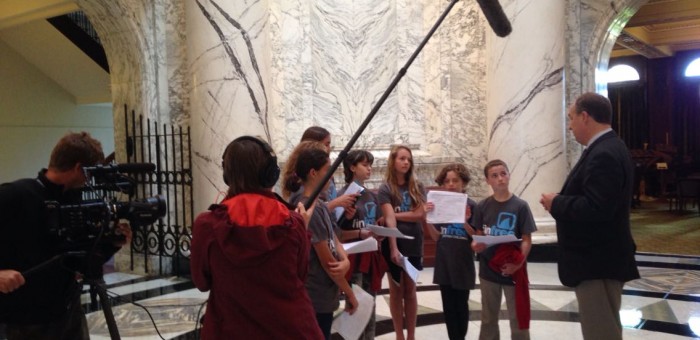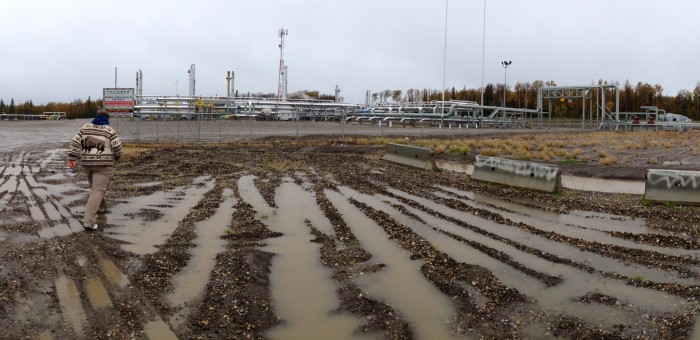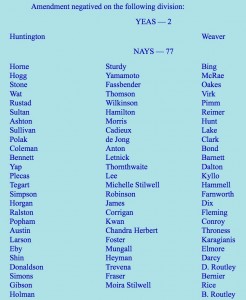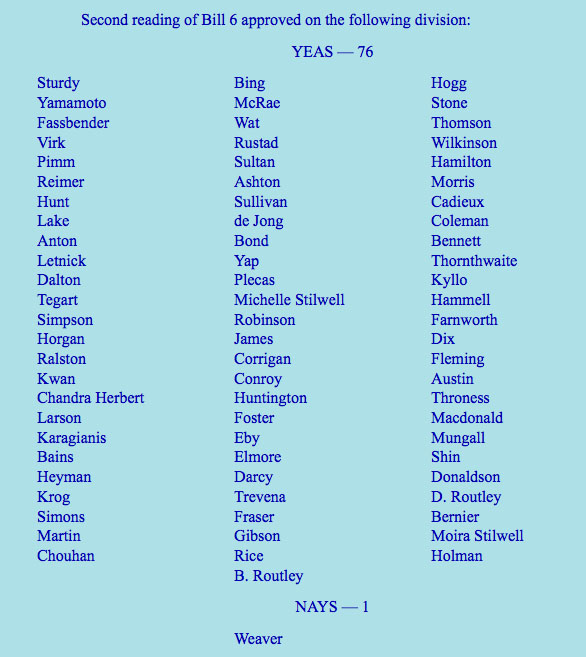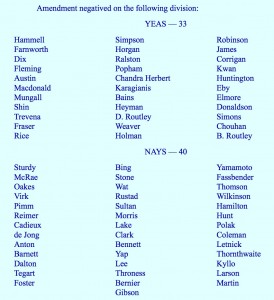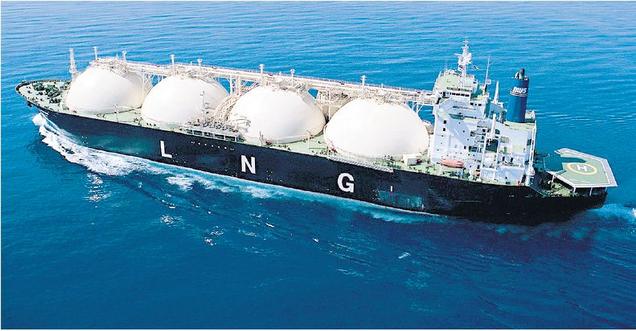LNG
Constituency Report – Review of the Fall Session and Issues in the Community
The Fall 2014 session of the Legislature has concluded with the passage of the LNG emission and taxation bills. Watch Andrew Weaver report on the debates and votes, along with events and issues that affect the riding of Oak Bay – Gordon Head and everyone around the province.
Thank you to SHAW TV for providing this community service.
LNG tax legislation rushed at expense of British Columbians
Today, on the final day of the fall sitting, I used my last speaking opportunity in the House to offer MLAs an opportunity to reconsider what I believe to be prematurely introduced LNG tax legislation.
At third reading I moved an amendment that would have sent Bill 6 – The Liquefied Natural Gas Income Tax Act to the Select Standing Committee on Parliamentary Reform, Ethical Conduct, Standing Orders and Private Bills, so that British Columbians could get answers to unresolved questions about the government’s LNG promises.
This legislation would benefit from a more thoughtful analysis by the Select Standing Committee. Third parties could be brought in for consultation, including the public, including First Nations and including the companies involved.
During the committee stage for the bill after 2nd reading, I also identified a number of potential loopholes that could be exploited by LNG companies to further reduce the already meager amount of tax that they would pay to BC.
In my view it was premature for us to consider passing a piece of tax legislation that contained no information about revenue projections and no substantive justification for the massive corporate tax breaks and incentives.
Our government has claimed that the revenue accruing from an LNG industry would bring British Columbia a $1 trillion boost to its GDP, a $100 million prosperity fund, 100,000 jobs, the elimination of its provincial debt, the elimination of the PST and thriving hospitals and schools. These are bold claims that so far have not been supported by any clear or reliable evidence.
Bill 6 was supposed to contain the details, supported by revenue projections, to substantiate these claims. Unfortunately, we never received anything of the sort. It is perplexing to me that both the government and the official opposition would vote to support this LNG tax legislation when absolutely no quantitative information has been provided about how it will impact British Columbians.
In moving the amendment I offered the government, the official opposition, and the public an opportunity to explore both the opportunities and possible pitfalls associated with this Bill in greater detail.
When it came to the vote, only independent MLA Vicky Huntington (Delta South) stood with me in the Chamber in calling for more time. The official opposition and the government voted together. It was truly remarkable to witness the opposition collectively stand in favour of this bill. So many of them had offered scathing condemnations of it during second reading.
The fact that the two independent MLAs were the only ones to suggest this Bill is incomplete in its current state is startling. British Columbia deserves real political leadership that is honest about the opportunities and the risks associated with any hypothetical LNG development.
While the government has described British Columbia’s LNG opportunity as a generational opportunity, this bill can only be described as a generational sellout.
The Amendment
I move that the motion for third reading on Bill 6, Liquefied Natural Gas Income Tax Act be amended by deleting all the words after “That” and substitute the words “the bill be not now read a third time, that the order for third reading be discharged, the bill withdrawn from the Order Paper and the subject matter referred to the Select Standing Committee for Parliamentary Reform, Ethical Conduct, Standing Orders and Private Bills.”
Speech to the Amendment
I wish to speak to the amendment and the reason why I brought it forward.
Through this committee stage, a number of issues have been clarified. There have been questions that would benefit exploration at committee stage. In particular, there are questions on revenue projections, the modelling, the assumptions into the modelling that have not been forthcoming and transparent in terms of us, as a legislature, to be able to assess this legislation.
There is section 32(c). There are issues that came up there with respect to a loophole for earned credits that could be sold by a company and the income from that not being claimed as taxable, yet the person purchasing it can claim the income as a deduction.
There are questions in section 46 with respect to the rates being left out. We haven’t got some guidance as to what that rate is in the formula there.
There are questions with respect to section 47 regarding a potential LNG loophole for tax avoidance through capital acquisitions and leaving the 1.5 percent LNG tax rate for significant times.
There are questions on section 122 with respect to the polluter-gets-paid as a polluter-pay model.
There are questions on section 172 that we did not have as much time as I would have wished to explore, in particular the one-half percent natural gas tax credit.
I would think that with such an important piece of legislation, which a government believes is outlining a direction for this province for years ahead, this legislation would benefit from a more thoughtful analysis at committee stage, at which point third parties could be brought in for consultation, including the public, including First Nations and including the companies involved, so that all in this Legislature are able to see the negotiations and the input that is required for such legislation to move forward.
This is the reason that I brought this amendment forward now, hon. Speaker.
Thank you very much for your time.
The Vote
Voting for a Responsible Economic Future for B.C.
Today we had a critical vote concerning the government’s proposed LNG industry.
Both the NDP and the Liberals voted to move Bill 6 – the Liquefied Natural Gas Income Tax Act to committee stage. In doing so, they voted for what I believe is ultimately a Generational Sell-out – one which will cost us the opportunity to forge a new path to develop a 21st century economy for British Columbia.
I stood alone and voted against this bill because it is fundamentally irresponsible.
The government and the official opposition are going all-in on an LNG industry despite a highly competitive market that is many steps ahead of us here in B.C. To catch up, this Bill offers a suite of tax deductions, exemptions and ultimately taxpayer funded rebates to entice industry to invest here. The hope is that we will be able to buy ourselves an LNG industry.
What I worry about is how much it will cost our province. If the bill passes, we will essentially be giving away our natural gas resources in order to fulfill the Liberal government’s desperate and hyperbolic election promise.
Instead of this pipedream, we have an opportunity to pursue a truly 21st century economy, with new investments into education and social services, a focus on new and emerging industries already found in our Province, and taking legitimate steps forward to address our contributions to climate change.
The passage of this Bill does not mean the province will crumble. However, this approach to our economy risks passing on a substantial debt to the next generation – forcing them to bear the consequences and the costs of our inaction today. This is not leadership.
I will continue to advance the only alternative that has been offered to the government’s plans: my vision of a diversified, sustainable 21st century economy–one that will serve today’s generation without burdening generations to come.
The Vote
The passing of Bill 2 – an end of an era
After nine days of debate, Bill 2 – The Greenhouse Gas Industrial Reporting and Control Act, finally passed committee stage and the Bill will receive Royal Assent shortly. As I mentioned earlier, Bill 2 will lock us into a path of increasing greenhouse gas emissions, while foregoing the development of a truly diversified and sustainable 21st century economy.
During second reading I spoke passionately against the bill, arguing that it represents a betrayal of future generations. I highlighted the fact that the bill replaced British Columbia’s continent leading greenhouse gas reduction policies with a made-in-Alberta, Harper government approach to reducing greenhouse gas emissions intensity.
During the days of debate I moved a hoist amendment that called for the bill to be delayed by 6 months to give MLAs and the public more time to scrutinize it. The amendment was defeated.
During committee stage I asked numerous questions to explore the consequences of implementing Bill 2. I probed the government’s rationale for dismantling its previous climate policies. And I proposed several amendments to the Bill to improve its clarity but all were defeated.
In one final attempt to provide clarity to British Columbians about what the bill was really doing, I moved an amendment to change the title from:
Greenhouse gas industrial reporting and control act
to
Greenhouse gas increase and industrial reporting act
As you will see from Hansard (reproduced below), the rationale for introducing this amendment was to make it clear what the bill will actually do. The title of the bill suggests that there is going to be a control on industrial emissions. This is not the case. The control is only going to be on industrial emissions intensity. That is, instead of reducing carbon pollution, the bill just allows industrial emitters to pollute more efficiently. I was hoping to make the bill transparent in that it was providing for an increase in greenhouse gas emissions.
A. Weaver: At this stage I’d like to move an amendment:
[TITLE, by deleting the text shown as struck out and adding the text shown as underlined:
BILL 2 – 2014
GREENHOUSE GAS INCREASE AND INDUSTRIAL REPORTING AND CONTROL ACT]
We had in this debate, at third reading, a number of amendments put forward to try to improve the legislation. They’ve all been defeated. We’ve just had the most recent amendment put forward by the member for Vancouver–West End — a nice amendment that was designed specifically to make this the cleanest LNG in the world.
In framing a title, it’s very, very critical that the title actually reflect the legislation that it is actually representing. What we have here is a title that says Greenhouse Gas Industrial Reporting and Control Act. The reality is there is no control in the greenhouse gas emissions associated with this act, so the amendment that I put forward is to change the title to the greenhouse gas increase and industrial reporting act, as I submitted and put on notice a couple of days ago.
The Vote
Bill 2 – BC at a Crossroads
B.C. finds itself at a crossroads.
It has a clear choice to make: do we support our government’s generational sellout to fulfill its hyperbolic election campaign promises — an all-in approach on LNG — or do we instead continue down the path we started to take in 2008 where we established our continent leading climate policies?
Today marked the 8th day of debate in the legislature on a bill that is a cornerstone of the government’s LNG agenda.
This bill connects two major parts of my life – my career as a climate scientist, and ultimately my decision to run in the last provincial election.
For 20 years I worked as a climate scientist and an educator.
I studied the impacts global warming would have on our communities and I shared that knowledge with young people in my classes and in our schools.
As a scientist, I worked with the B.C. government back in 2008 to develop bold new climate policies for our province. Those policies made us a leader in North America.
In the last 6 years, we have successfully reduced our GHG emissions, while forging a path for our economy that was both economically and environmentally sustainable.
All of that work–all of the progress that we as a province have made in addressing global warming–came to a head this week as we debated a bill that threatens to put it all at risk.
Titled the “Greenhouse Gas Industrial Reporting and Control Act”, this bill would lock us into a path of increasing greenhouse gas emissions, while foregoing the development of a truly diversified and sustainable 21st century economy.
To be clear, I am not opposed to the idea that LNG and the natural gas industry may have a role to play in our economy going forward. But a revitalized gas industry should arise if the market determines it is time for it to do so, not because the government hopes it is time for it to do so.
What I am opposed to, is the government laying out a means to give away our province’s resources in order to land an irresponsible political promise, one that is filled with hyperbole, lacking of substance and void of information and detail. Their approach amounts to a generational sellout.
Most troubling of all is that attempting to realize the government’s LNG pipe-dream necessitates British Columbia walking away from its climate leadership and turning its back on the blossoming economic opportunities that have accompanied this leadership.
As I oppose this bill, and the governments irresponsible and short sighted LNG agenda, I also think it is important to remember that we have another option.
Earlier in the session, I laid out a different vision for a diversified, sustainable, 21st century economy. With new investments in education, a return to properly funded government services and a focus on developing diversified and sustainable economic opportunities, we have an opportunity to build a true 21st century economy here in British Columbia.
As we debate this bill, I would like to invite you to read more about this opportunity. I would also like to invite you to send me your thoughts so that together, we can move our vision forward.
To read more about a diversified and sustainable 21st century economy please click here.

